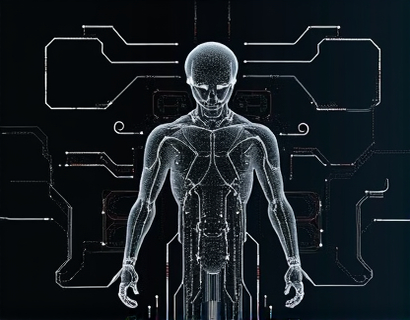AI Certification Innovations: Transforming Skill Validation and Career Advancement in the Digital Age
The digital age has ushered in a new era of technological advancements, particularly in artificial intelligence (AI), which continues to reshape industries and job markets worldwide. As AI technologies evolve, the demand for skilled professionals who can effectively leverage these tools has surged. In this context, AI certification has emerged as a pivotal mechanism for validating expertise and enhancing career prospects. This article delves into the innovations in AI certification, exploring how these credentials are transforming skill validation and career advancement.
The traditional methods of skill validation, such as degrees and general certifications, are being complemented by specialized AI credentials. These new certifications are designed to reflect the specific skills and knowledge required in the AI domain, offering a more nuanced and accurate assessment of an individual's capabilities. The shift towards task-based and educational milestone-driven certifications marks a significant departure from conventional accreditation methods, providing a more dynamic and relevant validation of skills.
Task-Based Certification: A New Paradigm
Task-based AI certifications focus on the practical application of skills through completed tasks and projects. This approach ensures that certified individuals have not only theoretical knowledge but also hands-on experience in real-world scenarios. By demonstrating proficiency through specific tasks, professionals can showcase their ability to apply AI concepts effectively, making their credentials more valuable to employers.
For instance, a certification program might require candidates to develop a machine learning model from scratch, including data preprocessing, model training, and evaluation. This hands-on approach not only validates the candidate's technical skills but also their problem-solving abilities and understanding of AI workflows. Such certifications are particularly appealing to tech companies looking for candidates who can hit the ground running with minimal training.
Educational Milestones and Continuous Learning
In addition to task-based certifications, the new generation of AI credentials also emphasizes educational milestones. These certifications acknowledge and reward the completion of key learning phases, encouraging continuous education and skill enhancement. This approach aligns with the rapidly evolving nature of AI, where ongoing learning is essential to stay current with the latest advancements.
Educational milestones can include completing a series of courses, passing comprehensive exams, or achieving specific project benchmarks. Each milestone represents a significant step in the candidate's learning journey, providing a clear pathway for professional development. This structure not only motivates learners but also ensures that they are consistently updating their skills to meet industry demands.
Enhancing Professional Credibility
The introduction of specialized AI certifications significantly enhances professional credibility. In a field where expertise is rapidly becoming a differentiator, these credentials serve as tangible proof of an individual's competence and commitment to the field. Employers increasingly recognize these certifications as indicators of a candidate's ability to contribute effectively to AI projects and initiatives.
Moreover, AI certifications can bridge the gap between academic qualifications and practical industry requirements. For professionals transitioning from other tech domains, these credentials provide a recognized pathway to establish themselves as AI experts. This is particularly valuable in a job market where versatility and adaptability are highly prized.
Boosting Job Prospects
The impact of AI certifications on job prospects is profound. With the growing number of companies integrating AI into their operations, the demand for skilled AI professionals continues to rise. Holding an AI certification can significantly enhance a candidate's chances of securing a position in this competitive field. Employers often view certified candidates as more reliable and capable, leading to better job offers and career opportunities.
Furthermore, AI certifications can open doors to specialized roles that may not require a traditional four-year degree but demand specific technical skills. This democratizes access to high-demand jobs, allowing individuals from diverse backgrounds to advance their careers based on their demonstrated expertise.
Customized Certificates for Diverse Skills
One of the key innovations in AI certification is the offering of customized credentials that cater to a wide range of skills and specializations. Whether it's machine learning, natural language processing, computer vision, or AI ethics, these certifications provide a tailored validation of an individual's expertise. This diversity ensures that professionals can choose credentials that align with their career goals and current market needs.
For example, a professional interested in AI ethics might pursue a certification that focuses on the ethical implications of AI technologies, including bias mitigation, privacy concerns, and responsible AI practices. Such specialized certifications not only enhance the individual's skill set but also contribute to the broader conversation on ethical AI development.
Recognition and Standardization
The growing acceptance of AI certifications by industry leaders and educational institutions underscores their value and credibility. As more organizations recognize these credentials, the standardization of AI certifications becomes increasingly important. Standardized certifications ensure consistency in the assessment of skills, making it easier for employers to compare candidates and for professionals to demonstrate their qualifications across different regions and industries.
Industry consortia and professional bodies are playing a crucial role in establishing these standards. By collaborating with tech companies, academic institutions, and government agencies, these organizations can develop certifications that meet the evolving needs of the AI workforce. This collaborative approach helps maintain the relevance and integrity of AI credentials, ensuring they remain a trusted marker of expertise.
Lifelong Learning and Career Growth
The AI certification landscape promotes a culture of lifelong learning, which is essential for career growth in the digital age. As AI technologies continue to advance, professionals must continually update their skills to remain competitive. AI certifications provide a structured framework for ongoing education, encouraging individuals to stay informed about the latest trends and innovations.
Moreover, these certifications can serve as milestones in a professional's career journey, marking significant achievements and areas of expertise. This not only boosts personal confidence but also enhances career progression, as professionals can leverage their certifications to take on more challenging roles and responsibilities.
Conclusion
The innovations in AI certification are revolutionizing the way skills are validated and careers are advanced in the digital age. By focusing on task-based and educational milestone-driven credentials, these certifications offer a more accurate and relevant assessment of an individual's abilities. They enhance professional credibility, boost job prospects, and promote continuous learning, making them an invaluable asset for tech professionals and students alike. As the AI landscape continues to evolve, these certifications will play an increasingly critical role in shaping the future of work.










































